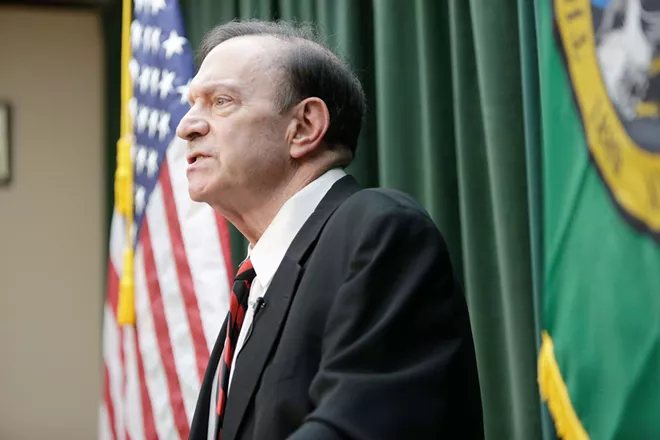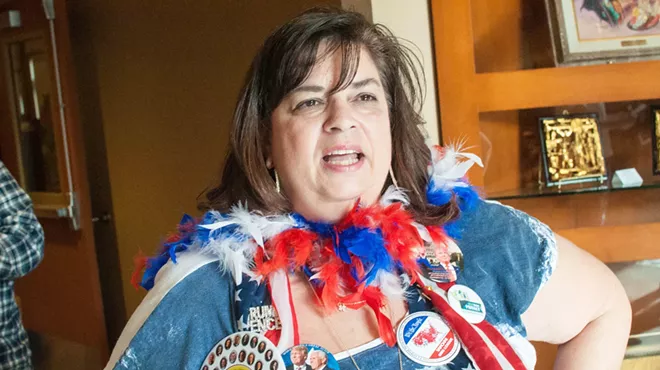This week, yet another major newspaper — this time the Seattle Times — reported on the slew of racist and bigoted comments from the wife of Spokane County Prosecutor Larry Haskell, raising the prospect that local attorneys may challenge Haskell's prior cases involving minority defendants.
Today, Larry Haskell, who has often approached this controversy by issuing carefully worded written statements, held a press conference to address the firestorm directly.
"I now understand what it would be like to be on trial by the media," Larry Haskell told the crowd of local reporters on Friday afternoon.
Gone was the hedging from earlier statements about whether his wife actually made the series of comments — including calling a Black woman the N-word, and describing herself as a "white nationalist." Gone was the focus on his wife's First Amendment rights to legally make such statements. At times, he was blunt about the character of his wife's comments.
"I believe her comments are racist, absolutely," Haskell says. "They're reprehensible. And they've caused a lot of pain. And I humbly apologize for that."
If it was proved one of his deputy prosecutors said that kind of thing, he says, they would be "summarily terminated."
Still, Haskell also expresses outrage that the media was using his wife's comments to question the impartiality of his office.
He says the "false narrative" that his prosecutor's office "of over 150 employees is complicit in racist behavior" could "not be further from the truth."
"There is no proof," Haskell says. "There is only innuendo. It is hurtful. It is painful. It is insulting. It hurt my people."
There are significant racial disparities throughout the Spokane County criminal justice system, particularly with the length of time that Black defendants stay in jail and the amount of bail they are charged. But Haskell, as he has before, denies he or his office was responsible for those disparities.
"With the allegation of racism, I would also welcome any independent investigation or audit of what we do in our office and how we do it," he says. "Bring it. We can withstand the light of day."
Haskell doesn't believe the disparity in the criminal justice outcomes in Spokane makes the local judicial system racist. But he also doesn't believe his wife Lesley Haskell's explicit racial slurs make her racist.
"I've known her since she was in her late 20s. I can tell you that she is not a racist," Haskell says. "I have known that woman for 30 years. And I do not believe she is a racist."
Kurtis Robinson, vice-president of the Spokane NAACP, says that kind of distinction is evidence of "cognitive dissonance," a term for the psychological gymnastics a mind performs in order to believe two contradictory ideas at the same time.
"They don’t really understand what racism really is," Robinson says. "They can have racist practices and make racist statements, but somehow in their thinking, they’re not racist."
If his office is racist, Haskell says, all the other local criminal justice agencies must be complicit, from the police to the judges to federal agencies, because they haven't raised the issue.
"They haven't raised it to me, they haven't raised to you," Haskell says. "They filed no bar complaints, no complaints with the judges."
The Inlander asked Haskell, however, whether there had been any grievances filed with the Washington State Bar Association that involved his wife's comments.
"None that have reached me," Haskell says.
The Inlander presses: None have reached him?
"Oh, wait a minute," Haskell says.
In fact, as he acknowledges, there had been a grievance filed with the Washington state bar over his wife's comments. And it wasn't new either — it was over 12 years ago. While it wasn't about racism, and the case was dismissed, it was directly related to one of Haskell's high-profile cases, and it may provide the most direct precedent yet for whether Haskell's wife's comments have a legal consequence.
"What they found was that I am not legally responsible, nor accountable for whatever my wife says," Haskell says.
The 2009 Spokane County trial of Shellye Stark was salacious enough to make true-crime TV. Literally, it became an episode of Snapped in 2013. It was an ugly and complicated case of first-degree murder. It involved online prostitution. Abuse. A car accident involving a bull moose.
And on the true-crime blog, Bonnie's Blog of Crime, commenters were thirsty for the latest details. And one commenter, in particular, seemed to always have the scoop.
"Shellye tried to cry during Mr. Haskell’s opening statement yesterday," LawFan08 wrote. "Unfortunately for her, the tears could not be produced."
She reported that then-Spokesman-Review reporter Meghann Cuniff "does not possess high levels of integrity."
After future Spokane City Councilman Michael Cathcart was nixed from the jury for discussing the case — or rather, discussing then-Deputy Prosecutor Larry Haskell's combover — LawFan08 celebrated, claiming that Cathcart thought Stark had been innocent.
Commenters rained praise upon LawFan08's insight and peppered her with questions. In this narrow little world, LawFan was a true-crime celebrity.
Cuniff, the former Spokesman-Review reporter, says the blog was a must-read.
"Just reading the comments, it was obvious that this person knew someone inside the case, or wanted to give the impression that was the case," Cuniff says.
In March of 2009, Stark was convicted of first-degree murder for killing her husband at the behest of her boyfriend, Brian Moore. By September, she'd officially filed a grievance with the Washington Bar Association against Larry Haskell.
Stark, still serving her sentence at the Washington Corrections Center for Women in Gig Harbor, arranged for the paperwork from the case to be delivered to the Inlander.
She had believed that "LawFan08" — and a second account "LawFan09" — was secretly Larry Haskell, argued that the "extrajudicial comments made by Mr. Haskell have proven to be heinous to my case," and called for a subpoena to be sent to the website to find out who was behind the screen name.
But in Larry Haskell's response, his attorney issued a clear denial: It wasn't "Mr. Haskell" who made comments under those screen names. It was Mrs. Haskell.
Cuniff had come to the same conclusion: LawFan would reveal details that could only come from if she was sitting in the courtroom, and sometimes the only person in the courtroom was Lesley Haskell.
"I quickly realized it was Larry's wife, because of the way they interacted during breaks," Cuniff says. "It was very obvious."
In retrospect, Cuniff says, a prosecutor's wife dishing out details on the case on a true-crime blog was a big story at the time.
According to an email obtained by the Inlander, Lesley Haskell went as far as to e-mail the owner of the blog, Bonnie Kernene-Prisbrey, from the same "lilaccrew" email address Larry Haskell listed when he ran that year for Airway Heights City Council.
"I thought you might enjoy a little Shellye humor!" she wrote, attaching a picture mocking Stark's appearance. "Someone in the Prosecutor's office made this."
She signed it, "Lesley."
Spousal privilege meant that the Haskells didn't have to testify against each other during the investigation.
Ultimately, Stark's complaint was dismissed: The state bar concluded that "insufficient evidence exists to prove unethical conduct by [Larry] Haskell by a clear preponderance of evidence in this matter," agreeing that the limitations about discussing details about cases applied to the prosecutor, not their spouse.
Today, Haskell says that even prosecutors can freely discuss events that have happened in open court.
"The ethical issue is: is she actually sharing insider information?" says Cuniff, now a journalist in California.
And, at times, LawFan's comments and predictions did seem to suggest she was, well, more familiar with Deputy Prosecutor Larry Haskell's thinking than simply an avid court watcher.
She'd write things like, "Mr. Bradshaw doesn’t think he needs to turn over that evidence but Mr. Haskell will argue that he does" and "the prosecution does not want a Dateline story being done and have taken action to stifle NBC/MSNBC" and "Just a note: Shellye will not be offered a second-degree plea bargain in exchange for her testimony against Brian. This will be a first-degree conviction or acquittal."
"That strikes me as being inside information," Cuniff says.
For months and years after the bar complaint was settled, commenters at Bonnie's Blog of Crime continued to request LawFan's assistance for details on the Stark case, writing things like: "Strange we don’t hear from LawFan anymore," "Where is Lawfan when we need him?" "Lawfan, do you have any current info in regards to Shellye or Brian’s cases?"
Lesley Haskell didn't respond. But she didn't stop making controversial comments in other venues. Her Facebook comments on Muslims resulted in an Inlander expose in 2015.
Today, Haskell says that none of his office's federal partners have ever come to him and asked about improper motives from his office's prosecution standards.
But in 2015, Assistant U.S. Attorney Aine Ahmed, a Muslim, did express outrage about Haskell's "weak-kneed" response to the Inlander's reporting about his wife's comments back then.
"I've gotten about 20 to 25 calls from people saying, 'Hey, is this the conversation that happens in the Haskell house?'" Ahmed told the Inlander.
And in a follow-up later that year, the Spokesman-Review showed that Haskell hadn't stopped dishing details on her husband's cases. Under screen names like "ShelbyA14" and "mysteryreader," Lesley Haskell opined that the family members of the kid who beat a World War II vet to death were "evil scum, wastes on society and should be annihilated."
After a car went over the Maple Street Bridge in January of that year, but before a police report had been released detailing the speed, Lesley Haskell commented that "a little birdie told me he was doing about 110 mph."
"I’d just as soon that everybody accepted some degree of responsibility and respect for sensitive matters that are ongoing, but I don’t control that,” Larry Haskell told the Spokesman-Review at the time.
But Haskell declined to say whether he'd asked his wife to be more careful with her online commenting, according to the Spokesman-Review.
And even now, he declines to detail exactly what kind of conversation happens in the Haskell home, declining to say if he'd ever tried to persuade his wife that she was wrong about the kinds of views she'd expressed publicly.
"I'm not going to answer publicly [about] the discussions we've had, but I speak to my wife on a regular basis regarding certain things that you're talking about," Haskell says.
When he reiterates that her social media comments were racist, the Inlander asked a fundamental question: How does that happen to someone you love?
"You want me to expose things that just aren't for public knowledge," Haskell says. "I have had many conversations with my wife regarding this stuff. And I have condemned it publicly. And I have called it reprehensible."



























